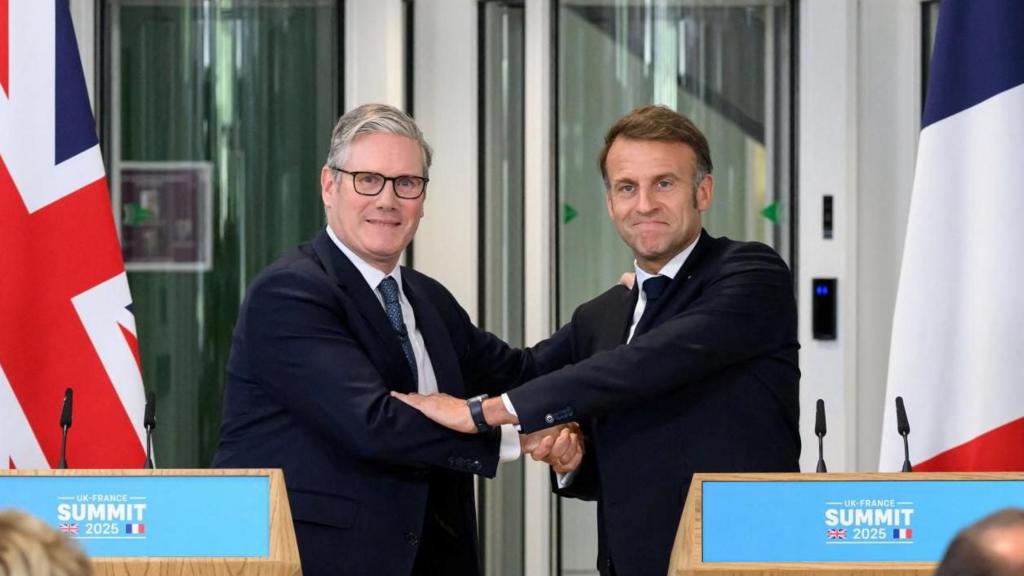Observing the President of France and the Prime Minister up close revealed two leaders facing considerable pressure, trailing in opinion polls, and defending what they perceive as the core tenets of their political ideology.
The central question is this: How do Sir Keir Starmer and Emmanuel Macron advocate for the virtues of patience, nuance, subtlety, and compromise in an era increasingly marked by impatience with the perceived repeated failures of those in positions of power?
At the leaders’ press conference, only two lecterns and two speakers were present, yet the presence of two other political forces loomed large.
Reform UK and National Rally, the party led by Jordan Bardella and Marine Le Pen, were never explicitly named, nor were their leaders. However, they were repeatedly referenced implicitly.
While these two parties on either side of the Channel are distinct, they share the same potential to instill fear in the current establishment.
They achieve this through anti-establishment fervor, a talent for clear communication, and by capitalizing on public disillusionment with traditional political figures—a potent combination.
“While we have been diligently working to secure a returns agreement, others have simply been taking pictures of the problem,” the Prime Minister stated.
Who might he have been alluding to?
He further added, “That is where the politics lies. We must demonstrate that pragmatic politics is the path to delivering tangible results for both our nations,” aiming to dissuade people from being swayed by what he termed “the politics of easy answers.”
Reform leader Nigel Farage spent the morning aboard a boat in the English Channel, accompanied by a GB News camera crew, and views this new agreement between Paris and London as a humiliation for the UK.
He argues that the UK should withdraw from the European Convention on Human Rights, asserting more broadly that the country can overcome its current malaise by supporting a party willing to be unconventional, vocal, and challenge the status quo. After the events of recent years, the argument goes, why not?
President Macron, facing similar arguments from National Rally at home, echoed the Prime Minister’s sentiments.
The President emphasized the need to acknowledge “the complexity of the world” and to resist what he described as the “temptation” offered by certain “populists.”
As I noted previously, this illustrates the Prime Minister’s evolving strategy—a more pointed public critique of Farage and what Sir Keir believes will be the choice at the next election: one of them leading the country from Downing Street.
A significant part of their debate, both now and in the years ahead, will revolve around small boat crossings.
New polling from Portland Communications indicates that 26% of Labour voters from last year’s general election who have since shifted to Reform would be significantly more inclined to return to Labour if the number of small boat crossings decreased.
The same poll reveals that eight out of ten Reform-leaning voters believe that Labour has had ample time to improve conditions across the board after one year in power.
Additionally, nearly half of all voters see Nigel Farage as the leader who best represents change.
This provides insight into the challenge and, potentially, the opportunity for the Prime Minister.
He is hoping for patience in an era defined by its opposite, while arguing that his opponent is offering a false promise.
His hope is that the mechanisms of government can deliver results over time. We shall see.
One final reflection.
On two separate occasions this week, I spoke privately with senior figures in both the Labour and Conservative parties who, without prompting, offered nearly identical observations about how the next few years might unfold.
Unsurprisingly, both individuals I spoke with are opposed to Reform UK winning a general election.
Both acknowledged that it was a real possibility, but each also expressed a deeper concern.
They both noted that many voters concluded last year that the Conservatives had failed, and many are concluding this year, or may soon conclude, that Labour is also failing.
Reform could succeed where its predecessors did not.
However, the two people I spoke with pondered, what would happen if Nigel Farage were to win and subsequently be deemed to have failed as well?
Where, they wondered, and in what political direction would the country turn next?

